The Home Run Derby: Who should be in?

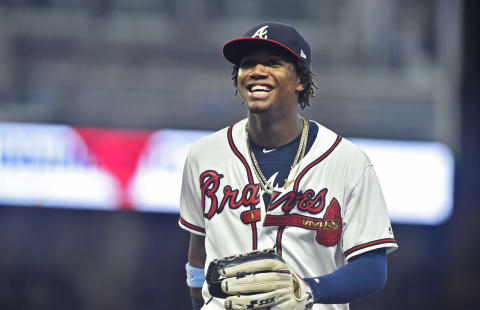
This year it’s a $1 million question. Here’s a projection of who deserves to compete for the cash
Major League Baseball’s Home Run Derby will feature a $1 million prize to the winner, a trophy that ought to ramp up interest not only in winning the exhibition but also in participating in it. At the same time it intensifies and pressurizes the process of selecting the eight participants.
Given the stakes what is needed are some criteria to qualify. Let’s look at what those criteria ought to be, and then put together the perfect Home Run Derby bracket based on those criteria.
- Two spots ought to be reserved for the guys who have hit the most home runs.
- This is a gun show, so two more spots ought to be set aside for the guys who have consistently hit the longest home runs.
- The defending champion ought to get a free pass; after all, he didn’t have a shot at $1 million last year.
- Following up on the gun show theme, two additional sports ought to be set aside for the guys – not already qualified – who have delivered the most long-distance bombs, those truly awe-inspiring shots in excess of 425 feet.
- The final spot should go to an at-large candidate capable of stirring fan passions. It might be an especially splashy rookie, a player having a career season, or an emerging star. Bonus points if the candidate plays for a team not normally on people’s radar screens; the easier for masses to rally around him. Finally, a competitor from the home city would stoke interest.
Those are the criteria: Let’s see how our ideal field would shape up. For the record, all data cited hereafter is as of June 18.
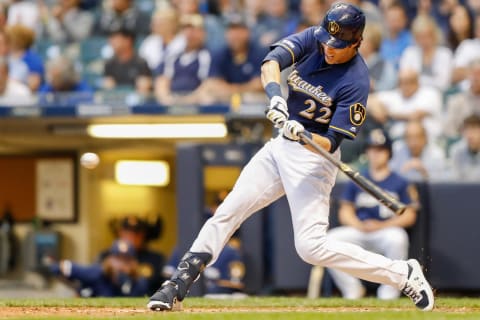
Home Run Derby
The home run leaders
Filling the first two slots is a counting exercise. Christian Yelich has led the majors in home runs all season. He had 26 home runs as of the tabulation date … and for the record has since then added two more.
In nominating Yelich, it must be noted that he is in one sense at least a flawed Home Run Derby candidate. While he delivers prodigious numbers, they are not – as a rule – inspiring shots.
Only four of Yelich’s first 26 home runs this season traveled in excess of 425 feet, the longest being 440. By current MLB standards for distance, 440 is not particularly long.
Still, Yelich is the MLB leader, so he is an automatic nominee to compete for the prize.
The other nominee for volume is Pete Alonso, first baseman of the New York Mets. As of June 18, he had 24 dingers, one more than either Hunter Renfroe or Cody Bellinger.
Alonso rates as a solid pick for several other reasons, first and most obviously being that he’s from New York. That ensures an intensely engaged audience.
He’s also a rookie, and fresh faces are always coveted in events of this sort. Beyond that, he is capable of going awe-inspiringly long. One quarter of Alonso’s first 24 homers carried more than 425 feet, his longest recently topping out at 458.
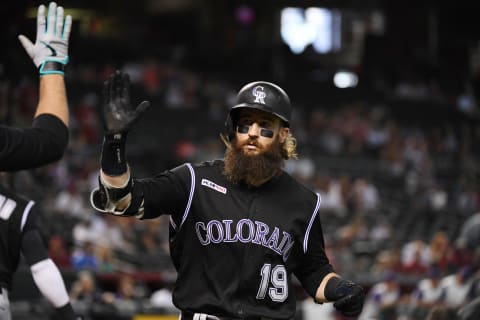
Home Run Derby.
Average distance
Here’s where matters start to get interesting, and possibly controversial. Qualifiers in this category are determined by the average home run carry of every player with a minimum of 15 home runs by the June 18 cutoff date. The results may be surprising.
The first qualifier, at an average home run distance of 423.69 feet, is Colorado’s Charlie Blackmon. Of Blackmon’s first 16 home runs, seven traveled in excess of 425 feet, and the shortest flew an impressive 381 feet.
Like Alonso, Blackmon also brings personality to the contest. Consider only his beard and his nickname, Chuck Nasty. There has to be a place in the event for him.
But, you say, Blackmon plays half his games in Colorado, where the thin air maximizes ball flight, giving him a big advantage. Your point is cheerfully granted…next case.
The runner-up for pure carry is Ronald Acuna Jr., Atlanta outfielder. The average distance of an Acuna blast this season is 419.56 feet, topping out at 462 feet. Also like Blackmon, Acuna doesn’t do cheapies. His shortest home run this season flew 389 feet.
We’ve now named half the field, but the competition for the remaining four spots is only going to grow more intense. It will intensify even more once the fifth slot, the one going automatically to the defending champion, is filled.
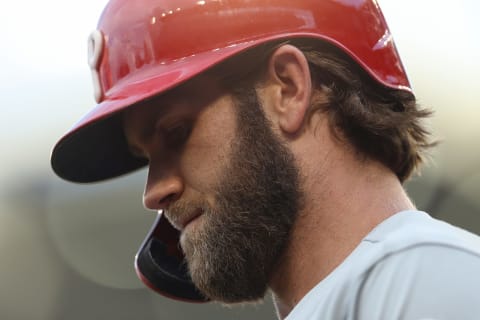
Home Run Derby
The defending champion
Bryce Harper hasn’t exactly torn it up in his debut season as a Phillie. With just a dozen home runs, he doesn’t even rank among the top 50 in that category.
Beyond that, Harper isn’t picking up the pace. He’s only hit one home run in his last 58 at bats. His overall stats are not compelling. He is carrying a .243 batting average, complementing those dozen home runs with 50 RBIs. His 109 OPS+ to date is above average, but hardly befitting his contract.
But Harper is the defending champion, having out-gunned runner-up Kyle Schwarber in a pulsating final round last season. And since the $1 million prize is new this year — Harper took away a piddling $125,000 for winning last year — it’s only fair that the reigning champion be given a chance to compete for the prize he would have taken away last season, had it existed.
With Yelich, Alonso, Blackmon, Acuna and Harper in the field, we are now down to just three slots. Consider merely the names not yet in: last year’s runner-up, Kyle Schwarber, AL home run leader Edwin Encarnacion, mega star Mike Trout, Freddie Freeman, Javier Baez, and Gotham slugger Gary Sanchez.
Beyond that are the prodigies: Tommy LaStella, Josh Bell, Hunter Renfroe, Jorge Soler, Ketel Marte. And remember, there’s $1 million at stake.
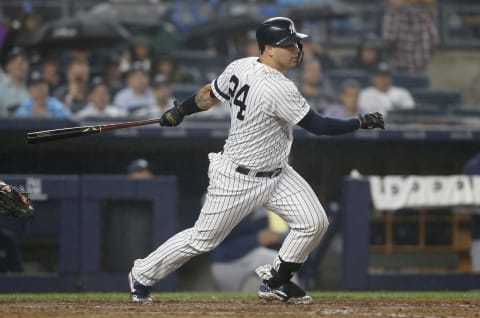
Home Run Derby
The bomb throwers
Of our final three slots, two are reserved for the guys who go very deep most consistently. We’re looking here for the two players, not already qualified, who have hit the greatest number of home runs of 425 feet or farther.
The first pick, sure to delight Yankee fans, is Gary Sanchez. His .269 average is a far cry from that inept season he put tougher last year, but it’s the home runs that really get your attention. Of Sanchez’s first 20, half flew 425 feet or more, topping out at 467 feet.
It is true that Sanchez’s raw numbers have benefitted from his playing within Yankee Stadium’s homer-friendly dimensions. But only a few; his 417 foot average home run length is second longest in the American League, trailing only Trout. And only six of Trout’s have carried 425 feet or farther.
Although Trout has 20 home runs, he was also edged out in this category by Texas slugger Joey Gallo. Currently on the injured list but expected to return well before the Home Run Derby, Gallo is the prototypical Home Run Derby candidate. He looks like he can hit any pitch literally out of the park largely because he can.
His 17 home runs this season include nine that carried a minimum of 425 feet. For what it’s worth, his average is 411.06 feet. So assuming Gallo’s healthy, he’s in. If he can’t make the start, his place will be taken by Pittsburgh Pirates slugger Josh Bell, with eight bombs in excess of 425 feet.
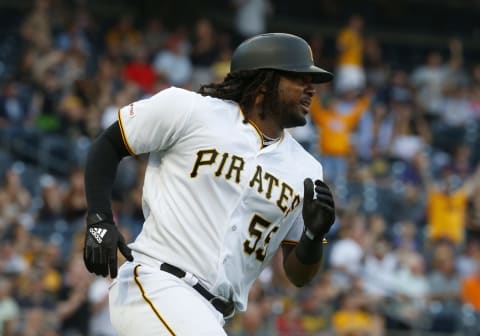
Home Run Derby
The wild card
The rich field of candidates for this last spot includes Trout, Bell, AL home run leader Edwin Encarnacion, Cody Bellinger, flashy Padre teammates Hunter Renfroe and Franmil Reyes, Freeman, and Cub teammates Baez and Schwarber.
More from Call to the Pen
- Philadelphia Phillies, ready for a stretch run, bomb St. Louis Cardinals
- Philadelphia Phillies: The 4 players on the franchise’s Mount Rushmore
- Boston Red Sox fans should be upset over Mookie Betts’ comment
- Analyzing the Boston Red Sox trade for Dave Henderson and Spike Owen
- 2023 MLB postseason likely to have a strange look without Yankees, Red Sox, Cardinals
What it lacks, unfortunately, is any plausible candidate from the home city, Cleveland. Carlos Santana leads the team, but he had only 14 as of the deadline for consideration.
Start by eliminating Trout, if for no other reason than because he doesn’t need either the fame or the money that comes with winning the Derby. Bellinger, whose 23 home runs mask the fact that he is more of an average hitter, also sits. His homers have averaged under 400 feet of carry this season, an unimpressive figure when compared with the other contenders.
Baez and Schwarber are similar enough candidates to knock each other out. Reyes is also eliminated because his teammate, Renfroe clearly has the superior numbers. Not only does Renfroe have six more home runs, but they’ve traveled an average of 412 feet, four feet longer than Reyes.
The final field, then, is reduced to Encarnacion (22 home runs, 408.23 average distance), Bell (20, 416.85), Renfroe (23, 412.57) and Freeman (20, 409.05). Because their average distances are shorter and also because they already have teammates in the field, Encarnacion and Freeman are stricken.
That boils the choice down to Bell’s greater average distance or Renfroe’s superior raw total. They are similar, both up-and-comers from small markets who would bring the kind of fan intensity that follows an underdog.
Next. Zion Williamson could hit 400 homers. dark
Since the Derby is essentially a show, I‘d opt for the distance and take Bell, making Renfroe the first alternate. The two could, however, swap places just as easily. If Bell supplants Gallo in the bomber category, Renfroe gets in.